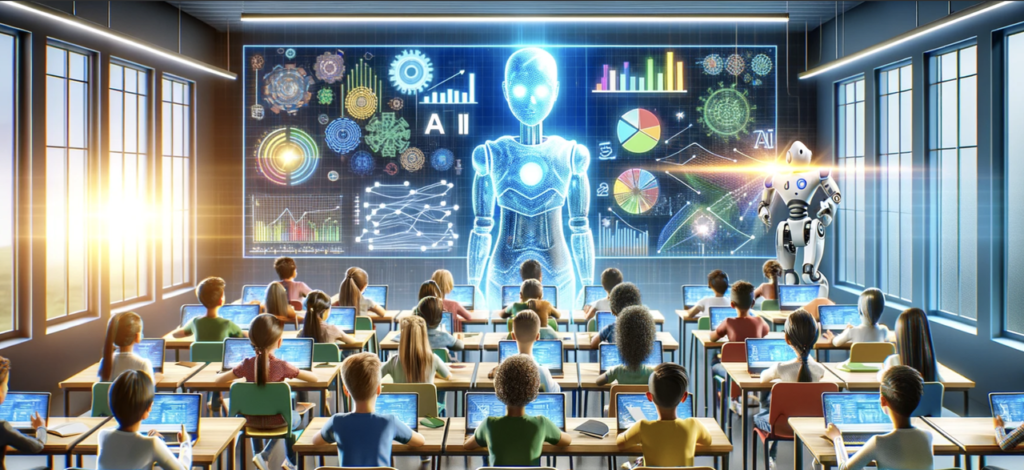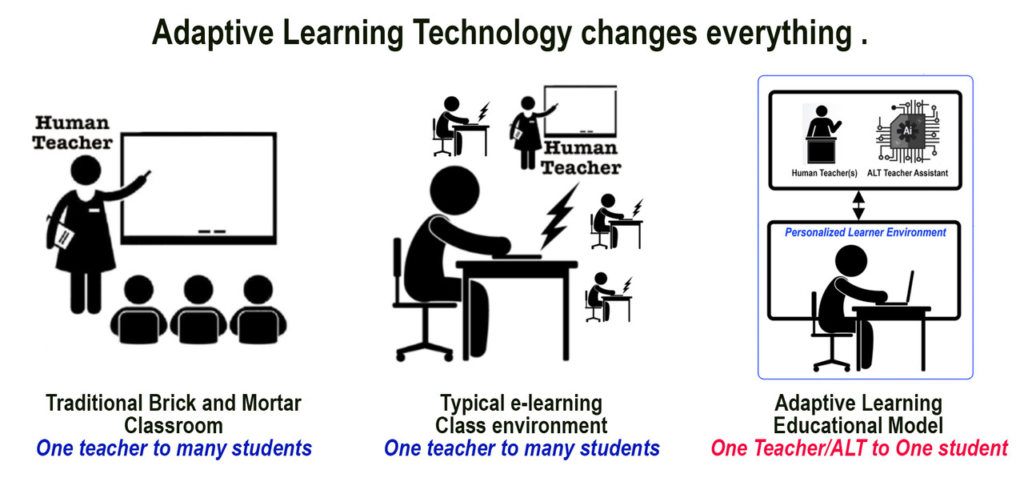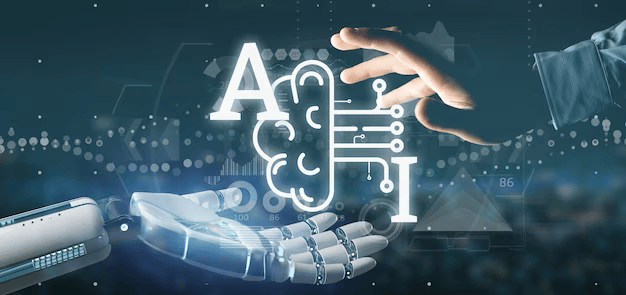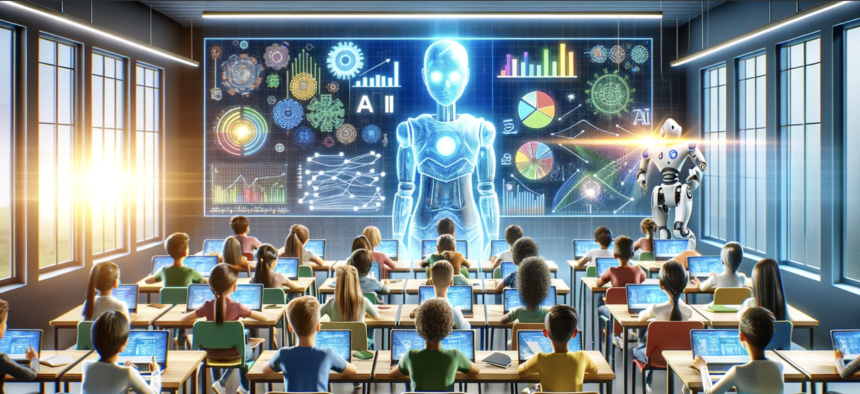In recent years, Artificial Intelligence (AI) has rapidly emerged as a transformative force with the potential to revolutionize education worldwide. AI encompasses a broad spectrum of technologies and applications designed to mimic human intelligence, enabling machines to learn, reason, and perform tasks traditionally requiring human cognition. In the realm of education, AI holds promise in enhancing learning experiences, personalizing education pathways, and optimizing administrative tasks. The AI powered systems can perform repetitive tasks faster and more accurately than humans. This trend is expected to continue and costs savings across various sectors. Similarly, AI in education can customize learning experiences based on students learning styles and progress, enhancing educational outcomes. This tool can analyze complex data patterns and trends, providing valuable insights to guide strategic decisions.
“AI in education will enable personalized learning experiences tailored to each student’s needs, revolutionizing how we teach and learn.”
Scope of AI in Education
AI in education refers to the use of artificial intelligence technologies to enhance learning processes, improve educational outcomes, and streamline administrative tasks within educational institutions. This encompasses a range of applications, including machine learning algorithms, natural language processing (NLP), personalized learning platforms, and educational data analytics. These technologies aim to create adaptive learning environments that cater to the individual needs and preferences of students, thereby optimizing learning efficacy and engagement. The future will likely see greater collaboration between humans and AI, where AI augments human capabilities rather than replacing them entirely. This human AI partnership can lead to innovation solutions to complex challenges and the development of new industries and opportunities.
Future of AI in Education
The future of AI holds immense promise and potential. From transforming industries and enhancing efficiency to improving personalized experiences and decision making. AI technology in education is here to stay and will only continue to evolve. Many educational institutions have already overcome the digital divide, even if extenuating circumstances drove them forward. Current AI technology already features a wide range of advantages. Yet as AI continues to evolve and new technology emerges. AI will continue to play an integral role in the future of education. AI can access each student’s progress and provide real time feedback, helping them identify their strengths and areas for improvement. Although, as it is often said, all that glitters is not gold.
“In the future, AI-powered virtual assistants will provide students with immediate support and feedback, enhancing their learning experience beyond the confines of traditional classrooms.”

Benefits of AI in Education
AI presents several key benefits in education. Firstly, it enables personalized learning experiences tailored to the pace, preferences, and abilities of each student. Adaptive learning systems powered by AI can dynamically adjust content delivery and difficulty levels based on real-time assessments of student performance, promoting deeper understanding and retention of knowledge. Additionally, AI-driven educational tools, such as virtual tutors and interactive learning platforms, offer students personalized feedback and support, fostering autonomous learning and problem-solving skills.
Furthermore, AI enhances accessibility and inclusivity in education by providing tools for language translation, speech recognition, and content customization to accommodate diverse learning needs. For instance, AI-powered transcription services can aid hearing-impaired students, while language translation tools facilitate learning for non-native speakers. These advancements not only break down physical and linguistic barriers but also promote equity in education by ensuring that all students have equal access to quality learning resources.
Challenges and Considerations
Despite its transformative potential, the integration of AI in education is not without challenges and considerations. One primary concern is the ethical use of AI, particularly regarding data privacy, security, and algorithmic bias. Educational institutions must navigate these issues carefully to safeguard sensitive student information and ensure fairness in AI-driven decision-making processes.
Advancement of AI Technologies
The rapid advancement of AI technologies requires ongoing professional development and training for educators to effectively integrate and utilize these tools in classroom settings.
Another critical consideration is the evolving role of educators in an AI-enhanced learning environment. While AI can automate routine administrative tasks and provide personalized learning support, the role of teachers remains indispensable in fostering critical thinking, creativity, and emotional intelligence in students. Educators must adapt to these changes by embracing AI as a complement to their teaching practices rather than a replacement for human interaction and mentorship. AI personalises learning experiences to motivate students. They are more invested in the learning material tailored to their interests and needs. Students learn at different speeds.
Learning of Adaptive Platforms
Adaptive platforms adjust the pace of learning according to a student’s needs. It ensures the learner is not left behind or rushed through the material. It offers more straightforward explanations on areas where they need more support and moves ahead to more challenging material when they excel. AI in education benefits not only students but also educators. Educators integrate it into different aspects such as teaching methods assessment tools and learning experiences. With AI teachers can analyze the strengths and weaknesses of each student without bias. It also helps improve the efficiency of the curriculum using data from students learning patterns. The advancement of technology has driven innovation in education. AI in education can process vast amount of data and mimic human like decision making processes.

Future Trends and Innovations
Looking ahead, the future of AI in education holds several promising trends and innovations. One notable development is the expansion of AI-generated educational content, including interactive simulations, virtual laboratories, and augmented reality (AR) applications. These technologies not only enhance engagement and experiential learning but also offer new avenues for exploring complex concepts in science, engineering, and other disciplines.
Additionally, AI-driven analytics and predictive modeling are poised to transform educational assessment and decision-making processes. By analyzing vast amounts of student data, AI algorithms can identify learning patterns, predict academic outcomes, and recommend personalized interventions to support student success. This data-driven approach enables educators and policymakers to make informed decisions about curriculum design, resource allocation, and educational policy formulation.
Advancement Role of AI in Future
AI is poised to play an increasingly pivotal role in shaping the future across domains, from healthcare to transportation and beyond. As AI technology continues to advance at a rapid pace, its impact on industries, society and everyday life is becoming more profound. AI technologies can improve access to quality education for students worldwide. Languages translation tools powered by AI can break down language barriers, enabling students to access educational resources in their native languages.

AI-Powered Platforms
AI driven assistive technologies can also support students with disabilities by providing personalized learning aids and adapting content to meet their specific needs, promoting inclusivity in education. This tool can act as virtual assistants, supporting educators in various ways. AI powered tools can automate administrative tasks. This allows teachers to allocate more time to interact with students individually. AI powered adaptive learning platforms can dynamically adjust learning materials and activities based on student’s performance and comprehension levels. These platforms provide real time feedback and recommendations, allowing students to progress at their own pace and focus on areas where they need improvement.
“By leveraging AI to analyze learning data, educators can tailor educational content to meet diverse student needs, ensuring every learner has the chance to succeed.“
Conclusion
In conclusion, AI represents a paradigm shift in the field of education, offering unprecedented opportunities to enhance learning experiences, improve educational access, and optimize administrative efficiency. However, realizing the full potential of AI in education requires careful consideration of ethical implications, ongoing professional development for educators, and a commitment to fostering collaborative partnerships between AI technologies and human instructors. By embracing AI responsibly and innovatively, educational institutions can pave the way for a more inclusive, adaptive, and effective learning environment that prepares students for success in an increasingly digital and interconnected world.








